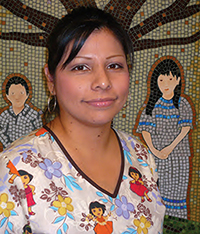 What experiences did you have to make sure this profession was right for you?
What experiences did you have to make sure this profession was right for you?
Growing up as a migrant worker, my mom was a single parent. I didn’t have my first dental visit until I was 14 years old. My mom had passed away by that time and it was my uncle who took my sisters and me to see a dentist. The three of us all had some pretty severe oral issues. I remember that was the only reason why he took us. After our check-up, I remember the dentist stressing to my uncle how important it was for us to see a dentist. I will never forget that moment. I always thought if I ever have kids that this would be an area I would stay on top of. Even now, I tell my little cousins how important it is to take care of their teeth. I tell them, “It’s not just your oral health that you need to care for, but your overall health too.”
Describe any obstacles or barriers to success that you encountered along your health professional career path. How did you overcome them?
The financial burden of taking out school loans was an obstacle my husband and I both encountered. I was working at Circle K and knew there was no way I could pay for my tuition on my own. My husband already had a huge school loan and we weren’t sure if I should take out an additional loan for my school. Financially, it would have been a big burden on both of us. Luckily, I was able go through the tribe and apply for financial aid through a program called the “Workforce Investment Act.” They awarded me two scholarships so that I wouldn’t have to take out any loans. By the first week, my tuition was paid and I was pretty much ready to roll. I was able to focus on my school and not worry about that extra bill each month.
What do you do in your current job?
As a dental assistant, I work with interns, residents, and contracted doctors, so we’re very busy. In our clinic, I have the opportunity to work with several Pascua Yaqui tribal members. I feel very lucky and blessed that I’m able to work with my own people. I also like the fact that the cost of treatment is not really an issue here, because most of the cost is covered by the tribe. I work at another private office in Tucson and money tends to be an issue for most patients there. But working here at the Pascua Yaqui clinic, it is very rewarding to know that we are able to provide the needed services for our patients at no cost.
What advice do you have for American Indian/Alaska Native students who are interested in health careers?
The dental field is a very rewarding career. I would like to see more Native students pursue a career in dentistry. If you’re willing to work hard and be productive, you can succeed in this line of work.
What would you like to see for your tribe’s future?
I would like to see a hospital built for the Pascua Yaqui community. I would feel very proud to see many Native Americans including a majority of the tribal community working there. It would give me a great joy. I think there should be more educational outreach and disease prevention as far as eating right and staying fit goes. Diabetes is like wildfire here. My mother had it, and I have a few uncles who have heart disease which is also on the rise in the community. I think if we could get our people to be more mobile and eat a little healthier, we could see some changes.
Do you practice traditional medicine? If you do, then how does traditional medicine interact with conventional medicine?
No, I really don’t practice traditional medicine. I’ve gone to alternative medicine a couple of times, but not on a regular basis.

